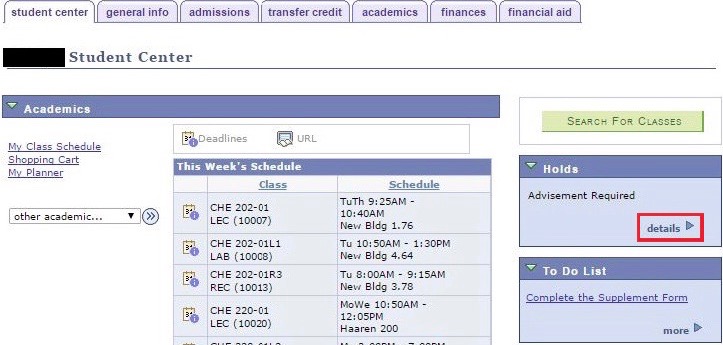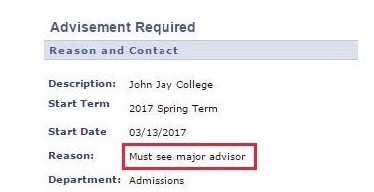Economics Major Resources
Here you will find:
- Key information about your major
- How and when to meet with your major advisor
- Planning tools that will help you track your progress in the major
- Ways to explore career opportunities related to the Economics major
Take a few moments to look at the information below. It will help you plan effectively and avoid surprises during your studies at John Jay. Please visit the Economics Department's website for information, resources, and opportunities!
Economics Requirements
You are responsible for the major requirements that were in effect when you declared the major. To confirm the requirements you should be following, go to the Undergraduate Bulletin for that academic year. For example, if you declared the Economics major in Fall 2015 or Spring 2016, you would click on the 2015-2016 Undergraduate Bulletin. If you declared the major and then left the College for more than one full semester, you’re responsible for the major requirements in effect when you return, if they have changed.
Below, find the Undergraduate Bulletin that was in effect when you declared the major.
- 2024-2025 Undergraduate Bulletin - ECO
- 2023-2024 Undergraduate Bulletin - ECO
- 2022-2023 Undergraduate Bulletin - ECO
- 2021-2022 Undergraduate Bulletin - ECO
- 2020-2021 Undergraduate Bulletin - ECO
- 2019-2020 Undergraduate Bulletin- ECO
- 2018-2019 Undergraduate Bulletin - ECO
- 2017-2018 Undergraduate Bulletin - ECO
- 2016-2017 Undergraduate Bulletin - ECO
- 2015-2016 Undergraduate Bulletin - ECO
- 2014-2015 Undergraduate Bulletin - ECO
- 2013-2014 Undergraduate Bulletin - ECO (PDF)
- 2012-2013 Undergraduate Bulletin - ECO (PDF)
Major Advising
All Economics advising is now handled remotely.
Economics majors, those interested in adding an Economics major, and those just curious about Economics can email either Thomas Herndon (therndon@jjay.cuny.edu) or Rita Taveras (rtaveras@jjay.cuny.edu). Please provide your EMPLID.
Economics majors should consult with an Economics advisor at least once per semester.
If you are transferring economics course credits from another college, check in with one of the major advisors to discuss how these credits have been evaluated and posted on your John Jay transcript. If there are any concerns or issues about economics credit evaluation, they will help you clarify and resolve them.
During Summer session (June 2 - August 25) 2025 Economics majors, those interested in adding an Economics major, and those just curious about Economics can email either Jay Hamilton (jhamilton@jjay.cuny.edu), Geert Dhondt (gdhondt@jjay.cuny.edu), or Rita Taveras (rtaveras@jjay.cuny.edu). Please provide your EMPLID.
Sophomores with 45-59 credits may have a hold on their registration. The hold will be removed when they have a major advising appointment with one of the Economics major advisors. This discussion will encourage wise planning and allow students to ask any questions they may have about the major. How do you know if you have a major hold? Go to CUNYfirst and complete the following steps:
- Check the Holds box of your CUNYfirst Student Center. If "Advisement Required" appears, click on “details.”

- Click on “Advisement Required.”

- See which type of advisement you need. If you must see a major advisor, then make a major advising appointment following the steps preferred by this department.

Plan Ahead: Graduate on Time
The Economics major requires that you take certain prerequisite courses in order to progress through the major, so it is important to plan accordingly. Keep the following guidelines in mind:
- Take ECO 101 and ECO 105 early, since they provide the foundation for this major.
- Take your Math course(s) early. MAT 141 or higher is recommended, but MAT 108 will also be sufficient. Depending on your CUNY math placement, you may need to start with MAT 105. Note: Though there is no requirement that you must take MAT 141 (pre-calculus) as a foundation for Economics, we strongly urge you to take MAT 141 instead of MAT 108. If you plan to advance in the field of economics, ultimately you will need calculus, and MAT 141 provides the foundation for that work, whereas MAT 108 does not.
- The Economics major was revised for the 2020-2021 academic year. Students fulfilling the 2020-2021 requirements should consult with the major advisor when planning their electives.
- We recommend that you avoid overloading on Economics courses in any semester. Try to spread them out and take them along with general education requirements.
- Transfer students should meet with an Economics advisor as soon as possible to discuss any Economics transfer credit, confirm what they still need to complete in the major, and develop a plan that makes sense.
- Remember that you will need at least a 2.0 GPA in the major and at least a 2.0 overall GPA to graduate.
- For those students fulfilling the major requirements prior to the revised 2020-2021 Bulletin: In the Part Two Electives area of the major, you will sometimes see a course on several of the cluster lists, but a course cannot satisfy more than one cluster. Furthermore, only one of the five courses in the Part Two Electives area can be at the 100 level.
- DegreeWorks degree audit - Use this online planning tool to track your overall progress toward graduation. You will see which of your general education and major requirements are completed, in progress, or still needed. Refer to the DegreeWorks FAQs to better understand how to use this helpful tool. Note: be sure to confirm the accuracy of your degree audit with a general advisor and major advisor.
- Fill out the Economics Major Checklist for students who declared before Fall 2021- or the Economics Major Checklist for students who declared Fall 2021 or later to keep track of which major requirements you have completed and which ones you still need.
- Sample Four Year Plan - See an example of how you could complete all your degree requirements (major, general education, electives) and graduate in four years! Remember that this sample plan shows just one possible way to combine your requirements. Transfer students in particular should work with advisors to determine a plan that works best for them.
A General Academic Advisor will confirm what general academic requirements you still need, make suggestions about smart course planning that will help you graduate without delays, discuss your interest in adding a minor or second major, inform you about opportunities such as study abroad, discuss general questions and concerns, and make helpful referrals. Visit the Academic Advisement Center's webpage for more information.
Economics and Careers
Economics majors are successful in a wide variety of careers. While there are many paths to pursue in business, economics majors are also successful in law, medicine, government, non-profits, international relations, as well as in academic positions. You may be surprised to learn how far-reaching and powerful a strong economics background can be, providing not only important perspective but problem-solving skills and tools to create a more just world. Why study economics? Listen to Professor Michelle Holder talk briefly about this major and the many ways it can prepare you for professional work. The impact of this discipline could be greater than you think. Learn about the important work that some professionals are doing as they apply economic principles to improve the lives of others.
| A profession isn’t just about income, but here’s some interesting data about what Economics majors may earn at the start and midpoint of their careers: | ||
| Selected Majors from Payscale Report (2016) | ||
| Major (BA and BS) | Early Career Pay | Mid Career Pay |
| Actuarial Science | $60,800 | $119,000 |
| Aeronautical Engineering | $63,000 | $113,000 |
| Economics | $53,900 | $100,000 |
| Statistics | $57,400 | $97,500 |
| Finance | $53,300 | $89,600 |
| Accounting | $48,300 | $77,200 |
| Criminology | $39,500 | $63,600 |
| Psychology | $38,300 | $62,100 |
| Criminal Justice | $37,000 | $59,100 |
John Jay’s Career Learning Lab is another great resource for questions related to job searches, internships, and career preparation. CLL staff are available to meet individually with students and alumni in L72.00 New Building. You can schedule an appointment or attend their walk-ins.